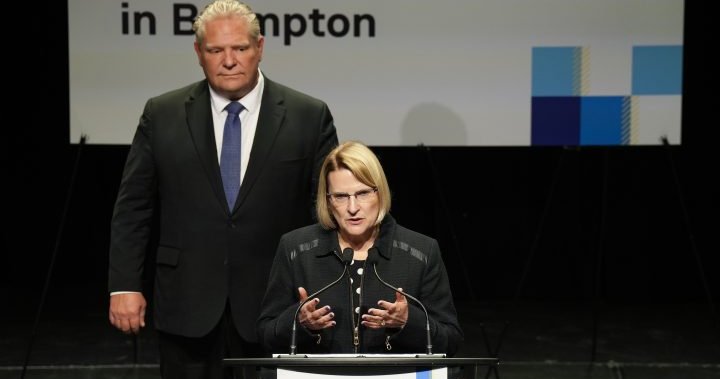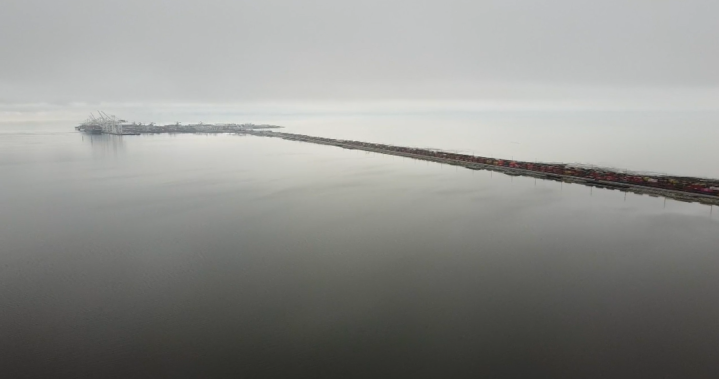Award-winning filmmaker Michelle Latimer’s Indigenous identity under scrutiny
An acclaimed film director lauded for two high-profile Indigenous productions this year says she’s sorry for not verifying her ties to an Algonquin community after facing questions over the validity of her identity.
Michelle Latimer, who recently directed the CBC television series Trickster and the documentary Inconvenient Indian, has risen to become one of Canada’s most prominent names in Indigenous filmmaking.
However, Latimer’s long-standing claim of Indigenous identity is facing scrutiny after she claimed to be of “Algonquin, Métis and French heritage, from Kitigan Zibi Anishinabeg (Maniwaki), Que.” in an Aug. 14 National Film Board (NFB) news release.
The claim caught the attention of Kitigan Zibi members who began questioning her family connection to the community, which is located about 120 kilometres north of Ottawa.
While Latimer believes she has a legitimate connection, she now says she made a mistake and should not have claimed that connection before she had the research to back up the link to the Algonquin First Nation.
“I sincerely apologize for naming the community of Kitigan Zibi publicly before I had done all of the necessary work to understand the connection,” said Latimer, in an emailed statement to CBC News. A similar statement was issued publicly on Thursday through Facebook.
‘Who are you?’ asks elder
One of Canada’s most prominent elders is from Kitigan Zibi. Elder Claudette Commanda is often asked to provide opening prayers for federal government announcements in Ottawa, which sits on unceded Algonquin territory.
Commanda said Latimer’s claim, without more evidence, was an “insult” to the community.
“Why are you claiming you are from Kitigan Zibi? What is your purpose and intent? What do you have to gain from this?” Commanda said to CBC.
“Who are you? And prove to me who you are.”
Commanda said Kitigan Zibi has seen a recent increase in unfounded ancestry claims to the community and such acts threaten the identity of her people who have survived in the face of immense hardship.
“Why is it that they just want the fame and glory, but they don’t want the struggles that come with it?” said Commanda.

“It’s an insult and it’s an exploitation and an appropriation of our culture, identity, community … That is what Michelle is doing and she is one of many.”
Latimer has been part of the Indigenous theatre and film community for years as an actor and director. During that time, her Indigenous identity claims have changed. At first she identified as Métis, before adding Algonquin to her biography, according to news reports dating back to 2004.
In the articles reviewed, Latimer never provided details outlining the roots of her claimed Indigenous identity.
In a 2013 Toronto Star interview, Latimer said she grew up in northern Ontario and that her “mother is First Nation” and that she’s “always had a foot in two canoes.”
In a 2014 interview she told the Yorkton Review that she didn’t “want to just be seen as an Aboriginal filmmaker, I want to be seen as a filmmaker.”
By at least 2015, Latimer identified as Métis-Algonquin, according to a profile by the Toronto Arts Council. She continued to identify as Métis-Algonquin until August 2020, when she added she was from “Kitigan Zibi (Maniwaki)” in publicity material preceding the Toronto International Film Festival screening of Inconvenient Indian.
CBC News exchanged emails with Latimer over a two-month period asking her to explain the roots of her identity claims. Latimer declined repeated requests for an interview.
In her emails to CBC News, Latimer said her understanding of her heritage evolved over the span of her adult life. Latimer said she identified as Métis at the start of her film career because she understood it to mean coming from a mixed French and Indigenous heritage.
“As my understanding evolved, I adjusted my bio to include Algonquin/French,” she said.
The Métis National Council does not recognize the existence of Métis communities in Quebec.
Claim based on ‘oral history’
In her emailed responses, Latimer said her claim rested on the “oral history” of her maternal grandfather.
“My grandfather loved these lands and knew them like the back of his hand and his stories became an important part of our oral history,” wrote Latimer.
Latimer did not provide any details on the source of her grandfather’s identity beyond seeing a family surname in a Kitigan Zibi census. She also directed CBC News to a photo gallery on a Kitigan Zibi community website which, she said, included photos of family members.
The photos do not include identifying captions and Latimer did not provide further details to CBC News.
She said her grandfather talked about being Indigenous and sometimes used the term Métis.
“My grandfather was a hunting and fishing guide along Baskatong Lake and moved around a lot. His family resided there and around the Kitigan Zibi/Maniwaki area before he enlisted in WWII,” said Latimer.
Baskatong, also known as Baskatong Bridge, was a Catholic mission north of Kitigan Zibi. The area is one of many traditional hunting territories north of the Ottawa River for Algonquin families.
By the time the village at Baskatong was flooded due to construction of a dam in 1927, the majority of its population was French-Canadian, according to census records.

“Now, you flash forward 100 years later and you have their grandkids or great-grandkids tracing their roots back to an Algonquin in Baskatong Bridge and seem to equate us with Baskatong Bridge,” said Stephen McGregor, former Kitigan Zibi chief.
He said Baskatong and Kitigan Zibi were not the same place.
Census records reviewed by CBC News state Latimer’s grandfather was French-Canadian.
Dominique Ritchot, a genealogist and researcher with an expertise in French-Canadian families, reconstructed Latimer’s genealogy independently.
Ritchot’s research found two Indigenous ancestors — Marguerite Pigarouiche and Euphrosine-Madeleine Nicolet — dating back to the 17th century.
“Most of her ancestors were quite easily identifiable as French Canadians, Irish, Scottish,” said Ritchot.
“Genealogy is all about looking at the document and asserting that what you have on your family is true because the documents don’t lie.”
She said Indigenous people were clearly identified either as “Indians,” “sauvages” or by nation in historical records.
Latimer said she has since hired her own genealogist to find answers, and recently reached out to elders and community leaders in Kitigan Zibi for guidance. She says the work will take time.
“My journey to reclaim my history is one that continues to evolve as I learn more about who I am and where I come from. At this stage of my journey, until the research has been completed and verified, I have no reason to doubt what my grandfather told me,” said Latimer.
“Although I should have known better, I genuinely believed that was where my grandfather was from.”
One of the people contacted by Latimer is Nick Ottawa, the lands membership and estates administrator at Kitigan Zibi Anishinabeg.
Before speaking with Latimer, Ottawa said he received multiple calls about her claims to the community in September. He confirmed she is not listed on the band’s registry. Ottawa said community members expect a validation process when someone makes a claim.
“If someone makes that claim, they better be prepared to validate themselves because people just don’t brush it off,” said Ottawa.
Sometimes, he said, even having a federal status card doesn’t mean a person is accepted by the community.
“Just claiming to be Algonquin is not enough. You have to be validated by the community — that’s the true validation,” said Ottawa.
Ancestral link vs. Indigenous identity
Kim TallBear, an associate professor of Native studies at the University of Alberta, said Indigenous identity claims based on a vague ancestral link are common in Canada and the U.S.
TallBear said some of these claims are not willfully malicious, but based on a misunderstanding that race and Indigenous identity are the same thing.
“There is a difference between race and being a member of Indigenous Peoples,” said TallBear, who is an enrolled member of the Sisseton-Wahpeton Oyate, which is part of the Dakota Nation.
“I don’t think they are willfully lying. They don’t understand what they don’t know.”

TallBear said these types of claims do pose a threat to Indigenous peoples and communities because they undermine the political and territorial underpinnings of Indigenous identity.
“The colonizer wants genetic ancestry alone to stand in for what counts as Indigenous — well that’s to their benefit. It helps disappear us in terms of being living communities that makes demands on resources, that makes demands for treaties to be upheld,” said TallBear.
“If Indigenous people were just nothing more than some genetic ancestor long ago, that would leave them off the hook for the obligations they owe to Indigenous peoples.”
Kitigan Zibi members have not been the only ones to question Latimer’s claims. Mi’kmaw filmmaker Jeff Barnaby said he began hearing rumours questioning Latimer’s identity over the past summer and began looking into it himself.
“If she is Native, then she is from somewhere … Anyone who wants to represent a Native community has to hail from a Native community,” said Barnaby.
Barnaby, who recently directed the film Blood Quantum and received acclaim for his film Rhyme for Young Ghouls, said if the evidence shows Latimer is not Indigenous, then it is an indictment on the film industry.
“They cannot seem to tell the difference between authentic representation and some white lady striking poses.”
Barnaby said he raised his concerns about Latimer’s Indigenous identity claims in an email on Aug. 12 to Jesse Wente, board chair of the Canada Council for the Arts and executive director of the Indigenous Screen Office.
Two days later, the NFB news release mentioned Latimer’s connection to Kitigan Zibi for the first time.
Wente, an Anishinaabe writer, broadcaster and speaker, said he became aware of questions around Latimer in early August and he raised the issue with her “to do the work necessary with her family and her community to seek the truth.”

Wente said these are complex and sensitive issues that should be handled with care, respect and healing at its centre.
“I’ve never had reason to question Michelle’s identity in the time I’ve known her,” said Wente, who produced Inconvenient Indian and hired Latimer to direct the film.
“These issues are best resolved at the community level. I have always been taught that public shaming causes more harm than it does healing. I believe we must always centre healing above harm, even when we hold people accountable.”
Wente said the Indigenous Screen Office has never funded any of Latimer’s projects and its vetting process does not allow for self-identification.
Over the last decade, Latimer has amassed a large number of awards, grants and fellowships recognizing her work at raising awareness of Indigenous rights and sovereignty.
This year, she won awards from the Toronto International Film Festival and a grant from Fork Films for a documentary on Mi’kmaw activist Annie Mae Aquash who was murdered while a member of the American Indian Movement.
Latimer also recently won Canada’s DOC Institute’s BMO-DOC Vanguard Award which included $40,000 in in-kind production services and a $1,000 cash prize and the Sundance Institute Screenwriting Labs’s Chicken & Egg Breakthrough Award.
“Obviously she is quite prominent … As the space she is occupying, has she done the work necessary to do that in the most respectful way? Ultimately, I would leave that question up to Michelle,” said Wente.
“To me she has always approached it with a great sensitivity, a great sense of rhythm and storytelling. This is why I wanted to work with her and why I admired her as a filmmaker.”





